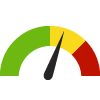Indicator Gauge Icon Legend
Legend Colors
Red is bad, green is good, blue is not statistically different/neutral.
Compared to Distribution
 the value is in the best half of communities.
the value is in the best half of communities.
 the value is in the 2nd worst quarter of communities.
the value is in the 2nd worst quarter of communities.
 the value is in the worst quarter of communities.
the value is in the worst quarter of communities.
Compared to Target
 meets target;
meets target;  does not meet target.
does not meet target.
Compared to a Single Value
 lower than the comparison value;
lower than the comparison value;
 higher than the comparison value;
higher than the comparison value;
 not statistically different from comparison value.
not statistically different from comparison value.
Trend

 non-significant change over time;
non-significant change over time; 
 significant change over time;
significant change over time;  no change over time.
no change over time.
Compared to Prior Value
 higher than the previous measurement period;
higher than the previous measurement period;
 lower than the previous measurement period;
lower than the previous measurement period;
 no statistically different change from previous measurement period.
no statistically different change from previous measurement period.
 Significantly better than the overall value
Significantly better than the overall value
 Significantly worse than the overall value
Significantly worse than the overall value
 No significant difference with the overall value
No significant difference with the overall value
 No data on significance available
No data on significance available
Crime Index
This indicator is archived and is no longer being updated. Click to learn more
The Crime Index reported in the FBI’s Uniform Crime Reporting (UCR) program is the most commonly used measure of crime and is a consistent sample that allows for national comparisons of rates per 1,000 population.
In 2018, the UCR program transitioned from its legacy data collection system to a newer UCR-Tech Refresh (UCR-TR) collection & publishing platform. The change in the computing platform may result in differences in UCR data from previous years, and caution should be used when analyzing data. Differences may be due too technical and procedural reasons rather than increases or decreases in crime.
Why is this important?
The UCR program collects Part I violent crime and property crime offenses that are serious by nature and/or volume, including murder and non-negligent manslaughter, forcible rape, robbery, aggravated assault, burglary, larceny-theft, motor vehicle theft, and arson. Not all crimes are readily brought to the attention of the police, nor are all crimes reported. Also, some serious crimes, such as kidnapping, occur infrequently. Therefore, UCR limits the reporting of offenses known to the eight selected crime classifications because they are the crimes most likely to be reported and most likely to occur with sufficient frequency to provide an adequate basis for comparison by law enforcement or use as social indicators.
The Crime Index has been modified many times since first published in 1960, mainly because larceny-theft makes up almost 60% of reported crime, and thus the sheer volume of those offenses overshadow more serious but less frequently committed offenses.
Measurement period: 2023
Maintained by: Truckee Meadows Tomorrow
Last update: March 2024
Graph Selections
Data Source
- Nevada Department of Public Safety
Maintained By: Truckee Meadows Tomorrow
Filed under: Community / Crime & Crime Prevention, Social Determinants of Health


